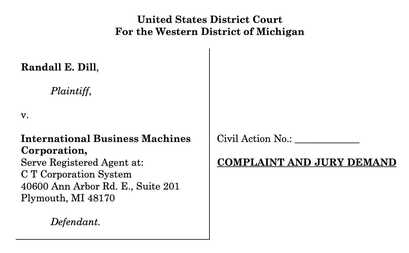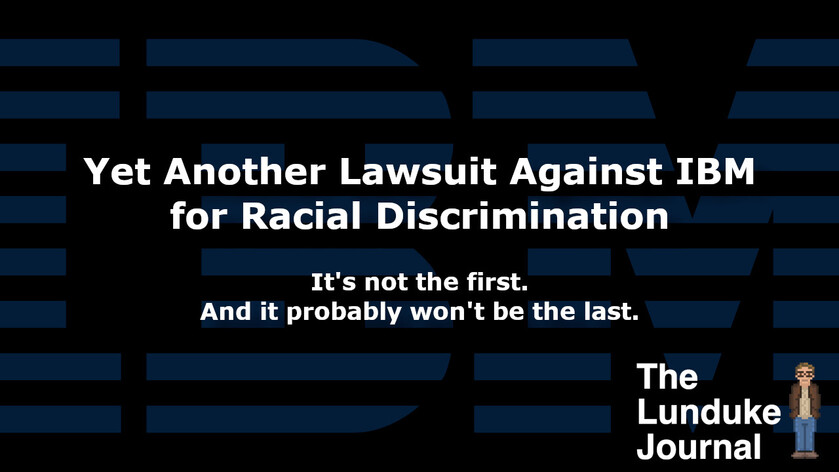The fallout from the IBM / Red Hat Leaks continues -- with yet another lawsuit filed against IBM, by a former employee, alleging racial discrimination.
In this latest lawsuit, Randall Dill (a former IBM employee), says that the company fired him... because he is a White man. This follows another, similar lawsuit filed against Red Hat (an IBM subsidiary) back in May... and the State of Missouri filing a lawsuit against IBM in June. Both of which focused on racial discrimination based on both leaks and public statements from IBM.

Considering the vast quantity of evidence (including videos of both the IBM and Red Hat CEOs, public statements, leaked presentations, and other documents) -- all of which makes it very clear that IBM knowingly (and purposefully) has been breaking the law by racially discriminating against employees -- it is not surprising that we are seeing a steady stream of lawsuits against the company.
From the Dill v. IBM lawsuit:
1. This is a lawsuit to remedy unlawful employment conduct, namely discrimination based on race and sex. As alleged further herein, Mr. Dill was a model employee at IBM Consulting, most recently having completed a four-year assignment at the Department of Defense, where he received outstanding performance reviews. Then, in July 2023, out of the blue, IBM placed Mr. Dill on a pretextual, vague, and unmeasurable Performance Improvement Plan, offered him no support, and terminated him in October. At the same time, corporate leadership was under pressure from the CEO and financially incentivized to hire people based on their skin color and sex. Mr. Dill, not being in the current preferred demographic, was terminated so IBM could pursue its illegal racial quotas.
2. Title VII Civil Rights Act of 1964 prohibits employment discrimination on the basis of race or sex in the United States.
3. Defendant International Business Machines Corporation (“IBM”) engages in intentional discrimination based on race and sex through the guise of “Diversity & Inclusion,” and it pushes its business divisions and subsidiaries, including IBM Consulting, to do the same.
4. As part of its Diversity & Inclusion program, IBM reports demographic statistics regarding its employees in its Annual Reports to investors, its annual ESG Reports, and its Form 10-Ks filed with the United States Securities and Exchange Commission (through incorporation by reference).
5. IBM incentivizes its executives to engage in impermissible race and sex discrimination by having “executive compensation metrics that include a diversity modifier to reinforce our focus and continued accountability for improving the diverse representation of our workforce.” Int’l Bus. Mach. Corp., 2022 Annual Report 16 (2023) (available at https://perma.cc/5PX2-9L2W). In other words, IBM conditions executive compensation on how much the company discriminates in hiring.
6. In this case, IBM engaged in sex- and race-based employment discrimination against Mr. Dill in violation of the Civil Rights Act of 1866 and Title VII of the Civil Rights Act of 1964.
7. Mr. Dill brings this action to vindicate his rights under these statutes and obtain legal and equitable redress for IBM’s unlawful discrimination
Regardless of what you or I think about "DEI" related employment policies, there's no denying the negative impact these policies are having on IBM (and Red Hat). Legal (and financial) ramifications, bad press, employee morale... all are impacted because of IBM's choice to discriminate against their employees based on ethnicity and gender.
Do you work for a Tech firm? Have you witnessed something that the public should know about? Want to become a whistleblower... but don't know where to start (or how to keep your identity a secret from your employer)? The Lunduke Journal has a "How to become an anonymous whistleblower" guide -- and we always protect the identities of all of our confidential sources.

















